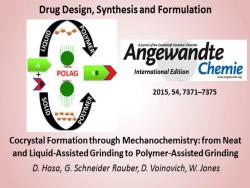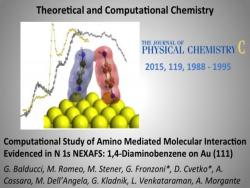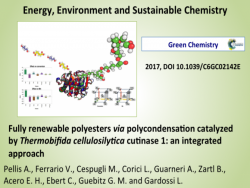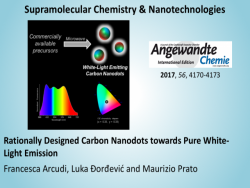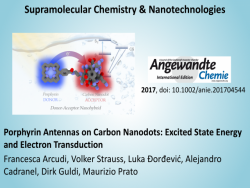Solid-state salification and mechanochemical activation of poorly bioavailable drugs
The "mechanochemical" process is a solvent-free process which consists in the conversion of mechanical energy into chemical energy: due to the mechanical treatment (mostly realized in high-energy mills), physical and/or chemical transformations are induced in the solid molecules.
Hence, the mechanical treatment may be used to prepare pharmaceutical solids in an extremely "active" metastable state (eg. nanocrystals, amorphous solids, solids with crystalline defects) stabilized by interactions with the polymeric carrier during co-milling, or for synthesis ("dry synthesis") of a more soluble salt realized in the presence of a polymeric carrier that acts, in this case, as a solid vehicle. The final product is highly in vitro and in vivo bioavailable and therefore the process is very suitable for poorly- soluble active ingredients suffering for poor in vivo absorption (see figure).
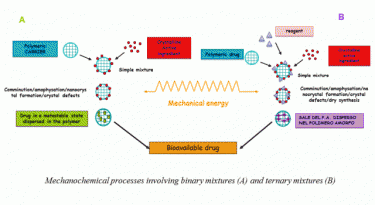
Mechanochemistry is also an effective method for the preparation of multicomponent crystal systems and for the deracemization of racemic compound/mixtures. Also in these perspectives the presence of a polymer (Polymer-assisted grinding- POLAG) can be useful for improving reaction rate and for increasing product diversity, as demonstrated in the case of mechanochemical cocrystallization reactions (see figure)
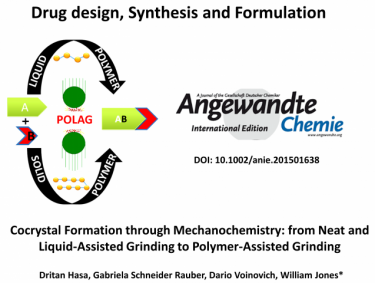
Collaborations: M. Grassi (Dept. Engineering and Architecture), Francesco Princivalle (Dept. Maths/Geosciences), Davide Lenaz (Dept. Maths/Geosciences), Sergio Invernizzi (Dept. Life Sciences), Cinzia Cepek (TASC, Area Science Park), Elvio Carlino (TASC, Area Science Park), Roberto Gobetto (Univ. of Turin), Michele Chierotti (Univ. of Turin), Erica Franceschinis (Univ. of Padua), Stefano Dall’Acqua (Univ. of Padua), Nadia Passerini (Univ. Bologna), Beatrice Albertini (Univ. Bologna), Iztok Grabnar (Univ. Ljubljiana), Gabriela Schneider Rauber (Univ. Cambridge), William Jones (Univ. Cambridge).
PUBLICATIONS
- Hasa, D., Schneider Rauber, G., Voinovich, D., Jones, W. Cocrystal Formation through Mechanochemistry: From Neat and Liquid-Assisted Grinding to Polymer-Assisted Grinding Angewandte Chemie - International Edition 2015 Article in press.
- Gaglioti, K., Chierotti, M.R., Grifasi, F., Gobetto, R. , Griesser, U.J., Hasa, D., Voinovich, D., Improvement of the water solubility of tolfenamic acid by new multiple-component crystals produced by mechanochemical methods CrystEngComm Volume 16, Issue 35, 21 September 2014, Pages 8252-8262
- Hasa, D., Perissutti, B., Voinovich, D., Abrami, M., Farra, R., Fiorentino, S.M., Grassi, G., Grassi, M. Drug nanocrystals: Theoretical background of solubility increase and dissolution rate enhancement Chemical And Biochemical Engineering Quarterly, Volume 28, Issue 3, 2014, Pages 247-258
- Hasa, D., Perissutti, B., Grassi, M., Voinovich, D., Invernizzi, S., Drug Salt Formation Via Mechanochemistry: The Case Study Of Vincamine. Molecular Pharmaceutics, 10, 211-224.
- Hasa, D., Voinovich, D., Perissutti, B., Grassi, G., Fiorentino, S., Farra, R., Abrami, M., Colombo, I., Grassi, M. Reduction of melting temperature and enthalpy of drug crystals: Theoretical aspects European Journal of Pharmaceutical Sciences Volume 50, Issue 1, 2013, Pages 17-28.
- Hasa, D., Perissutti, B., Grassi, M., Chierotti, M.R., Gobetto, R., Ferrario, V., Lenaz, D., Voinovich, D. Mechanochemical activation of vincamine mediated by linear polymers: Assessment of some "critical" steps European Journal of Pharmaceutical Sciences. Volume 50, Issue 1, 2013, Pages 56-68
- Hasa, D., Perissutti, B., Chierotti, M.R.,, Gobetto, R.,, Grabnar, I.,,Bonifacio, A., Dall'Acqua, S.,, Invernizzi, S., Voinovich, D. Mechanochemically induced disordered structures of vincamine: The different mediation of two cross-linked polymers International Journal of Pharmaceutics Volume 436, Issue 1-2, 15 October 2012, Pages 41-57
- Hasa, D., Voinovich, D. , Perissutti, B. , Grassi, M., Bonifacio, A., Sergo, V.b, Cepek, C., Chierotti, M.R., Gobetto, R., Dall'Acqua, S., Invernizzi, S. Enhanced oral bioavailability of vinpocetine through mechanochemical salt formation: Physico-chemical characterization and in vivo studies Pharmaceutical Research. Volume 28, Issue 8, August 2011, Pages 1870-1883
- Hasa, D., Voinovich, D., Perissutti, B., Bonifacio, A., Grassi, M., Franceschinis, E., Dall'Acqua, S., Speh, M., Plavec, J., Invernizzi, S. Multidisciplinary approach on characterizing a mechanochemically activated composite of vinpocetine and crospovidone Journal of Pharmaceutical Sciences Volume 100, Issue 3, March 2011, Pages 915-932
- Grassi, G., Hasa, D., Voinovich, D., Perissutti, B., Dapas, B., Farra, R., Franceschinis, E., Grassi, M. Simultaneous release and ADME processes of poorly water-soluble drugs: Mathematical modeling Molecular Pharmaceutics Volume 7, Issue 5, 4 October 2010, Pages 1488-1497
- Voinovich, D. , Perissutti, B., Magarotto, L., Ceschia, D., Guiotto, P., A.Bilia, R. Solid state mechanochemical simultaneous activation of the constituents of the Silybum marianum phytocomplex with crosslinked polymers Journal of Pharmaceutical Sciences Volume 98, Issue 1, January 2009, Pages 215-228
- Voinovich, D., Perissutti, B., Grassi, M., Passerini, N., Bigotto, A. Solid state mechanochemical activation of Silybum marianum dry extract with betacyclodextrins: Characterization and bioavailability of the coground systems Journal of Pharmaceutical Sciences Volume 98, Issue 11, November 2009, Pages 4119-4129
Research Group
| Salification and mechanochemical activation Group |


